Krevlornswath of the Deathwok Clan, otherwise known as Lorne or ‘The Host’, wasn’t a planned character in Angel. Upon seeing Andy Hallett (personal assistant to Kai Cole, co-creator Joss Whedon’s then-wife) perform at a karaoke bar, Whedon conceived the idea for Lorne and invited Hallett to audition for the role. His lack of acting experience wasn’t an issue, as Hallett won the part and brought such sensation and depth to the character that he ended up being a regular. Out of a total of 110 episodes, he appeared in 76.
Lorne is a green-skinned, devil-horned empath demon and honorary member of Team Angel. With his cheerful constitution, funky fashion sense, and pacifist demon karaoke bar, it’s no surprise that Angel fans took a liking to him. Being a rather reluctant helper for Angel and co. due to his natural neutrality, Lorne usually takes a backseat in the narrative. Despite this, he certainly finds his moments in the spotlight, and that’s what I’m here to look at.
Born in the demonic dimension Pylea, Lorne was ostracised from his family due to his gentle nature. His fellow demons were bloodthirsty warriors who treated humans like cattle, while he took pleasure in beauty, art, and music (despite there being no music in Pylea). Lorne’s values are that of peace, compassion, and empathy; as he says in S2E19 “Belonging”:
How are you supposed to joust someone when you partially agree with their point of view?
Moral grey areas are Angel’s specialty, but it’s rare to see a person so pure in their kindness and non-violent approach in the show. Lorne is a true gem in this respect, and a real breath of fresh air. The darkness and spiral into depravity in Angel’s arc in Season 2 needed a lighter contrast to balance out the tone, and Lorne’s introduction provided this in abundance.
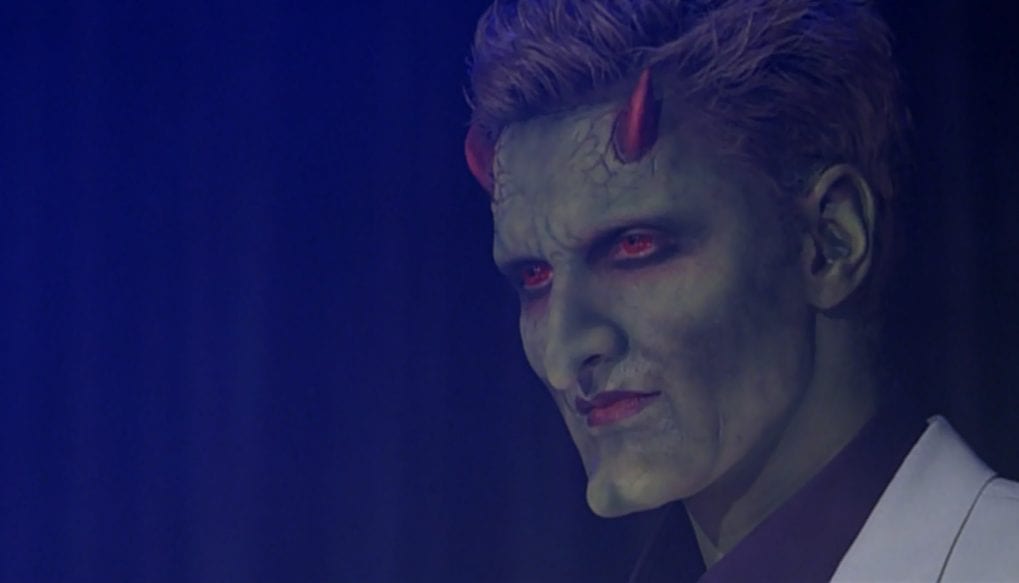
Luckily for him, but not-so-luckily for Fred who ended up trading places with him, Lorne serendipitously got sucked through a portal to Los Angeles in 1996. Discovering music was life-changing for him, and in the exact spot where he appeared on Earth, he decided to open Caritas (Latin for ‘mercy’), a violence-free karaoke bar for demons. His supernatural powers enable him to read people’s minds and auras while they sing, which he uses to provide guidance to those who feel lost. Other powers of his include superhuman hearing, damage-inducing vocal tones, regenerative healing (including from decapitation), and enhanced singing ability.
Caritas is where Angel and his friends are first introduced to Lorne in S2E1 “Judgement”, and they return frequently throughout Season 2 to perform for him—either for help or recreationally. Although initially reticent due to his neutral stance, Lorne is always a source of encouragement for the gang, becoming more and more involved with the plot as the show goes on. He finally gets to leave the karaoke bar in S2E13 “Happy Anniversary”, as he comes to Angel with a case for once. Since Angel is sans Cordelia, Gunn, and Wesley as a result of pushing them away in his downward spiral, he and Lorne buddy up throughout the episode. Their one-on-one interactions are a lot of fun—brooding, dark-clothes-clad, stoic Angel next to the flamboyant, brightly-dressed, bubbly Lorne makes for a wonderful contrast. Oh, and that part where Lorne repels a bunch of demons by belting out a high note? Unforgettable.
He first becomes central to the plot on a reluctant return to Pylea to save Cordelia in the four-part Season 2 finale. This is where we learn about his backstory and previously stated powers in more detail. Since music doesn’t exist in Pylea, Lorne causes severe pain to his fellow demons by singing “Stop, In the Name of Love” in a memorable moment (similar to the high note in “Happy Anniversary”), allowing Angel to escape with Fred. We meet his mother, his brother Numfar, and his cousin Landokmar. All these demons of the Deathwok Clan are extremely gimmicky (especially with Joss Whedon himself playing Numfar), but they give us more insight into Lorne’s personal life. In fact, his family situation reads strongly as a queer-coded story.
Here is an already queer-coded character—with his extravagant colourful suits, diva attitude, and general theatrical presence—who has always felt alienated from his family due to his distaste for violence and love of…beauty, art, and music. His ostracisation coupled with his green skin colour should lend itself to a racism analogy, but since his family all look the same as him, it works better as an analogy for his sexuality. He’s basically the gay younger sibling. Returning to Pylea, however temporarily, reaffirms that Lorne never belonged there. He’s happy to return to L.A., the place where he can express himself more freely and in a way that more closely reflects who he is.
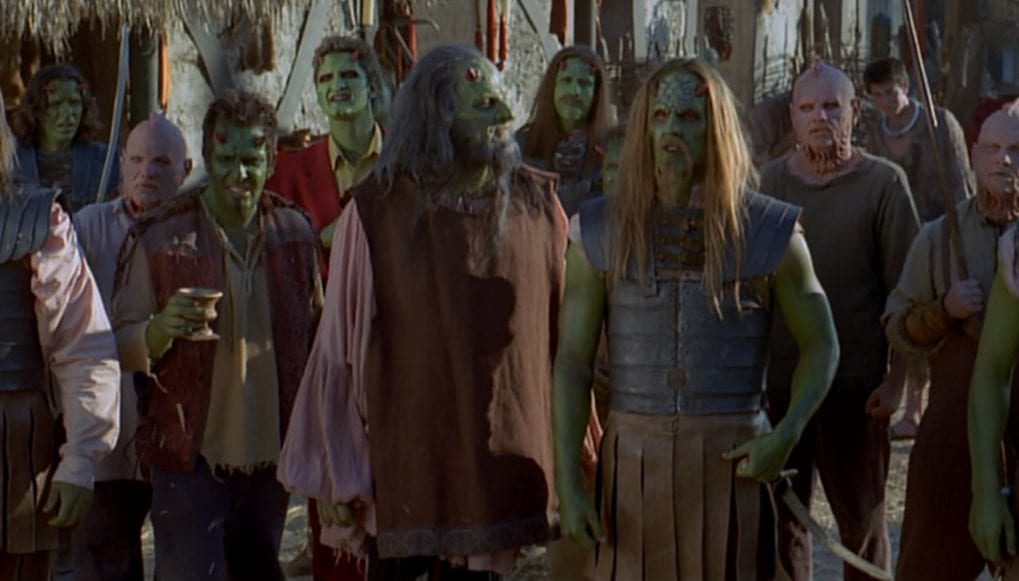
In S3E3 “That Old Gang of Mine”, Gunn sadly discovers that his old squad have been hunting and killing demons unwarranted. They make an attack on Caritas, and can commit violence there since the pacification spell only works on demons. In the aftermath of the attack, the spell is updated to include humans. Tragically, in S3E9 “Lullaby”, Big Bad Daniel Holtz explodes the bar in pursuit of Angel and Darla. He finds a loophole in the spell by not being present inside Caritas, but instead throwing in a gasoline barrel and grenade from the outside. The whole bar is destroyed for good. It’s a moment of complete tragic devastation, with the explosives falling down the stairs in slow-motion and the flames encircling the characters. Caritas was a true sanctuary for not only Team Angel, but for all human- and demon-kind alike. Even with Lorne himself being more of a side character at this point in the show, the loss of his bar is deeply felt.
Lorne soon moves into the Hyperion Hotel with the rest of Team Angel, consolidating his position as an integral player. He often babysits Connor, Angel’s newborn child who was born in the alleyway next to a burning Caritas. With Darla dead, the whole team contributes to childcare, but perhaps Lorne most of all, next to daddy dearest himself. His musical ability helps a lot in singing baby Connor to sleep, which is always a very sweet image. A demon nanny sounds like the premise of a cheesy horror film, but it’s an amusing and heart-warming portrayal here.
Andy Hallett reportedly worried that they were going to exhaust the character early on, with repeated returns to the karaoke bar. But despite Lorne being one of the rather under-developed characters in Angel, the writers found ways to keep him fresh. After helping out from the sidelines and being made redundant as Connor’s babysitter following his age-up, Lorne decides to pursue his singing career in Las Vegas. “The House Always Wins” (S4E3) is a Lorne-centric episode focused on this. With Cordelia missing and Wesley in his isolated, edgy phase, Angel, Fred, and Gunn take a well-needed vacation to visit Lorne in Las Vegas. Unknown to the gang, our favourite green demon is actually being held hostage at the Tropicana. Since he can read people’s futures, he’s being blackmailed by casino owner Lee DeMarco, who is causing people with bright forecasts to mystically gamble away their futures. If Lorne doesn’t cooperate or tries to seek help, DeMarco will kill one of the ‘Lornettes’, his backing singers.
Although the tone of the episode is rather light-hearted (Angel making quips about knowing Bugsy Siegel and attending Elvis and Priscilla’s wedding is a highlight, as is Lorne’s performance of “Lady Marmalade”), the plot itself is incredibly dark. Lorne’s empathic powers are taken advantage of and used for evil purposes. Seeing such a kind and compassionate character abused and manipulated into harming other people is crushing to watch. Of course, Angel (though really, Cordelia) saves the day along with Fred donning the disguise of a Lornette, and Lorne is brought back to L.A. with the team. It’s a turning point for Lorne’s character in a way; from this episode onwards, he appears in every single episode of Angel.
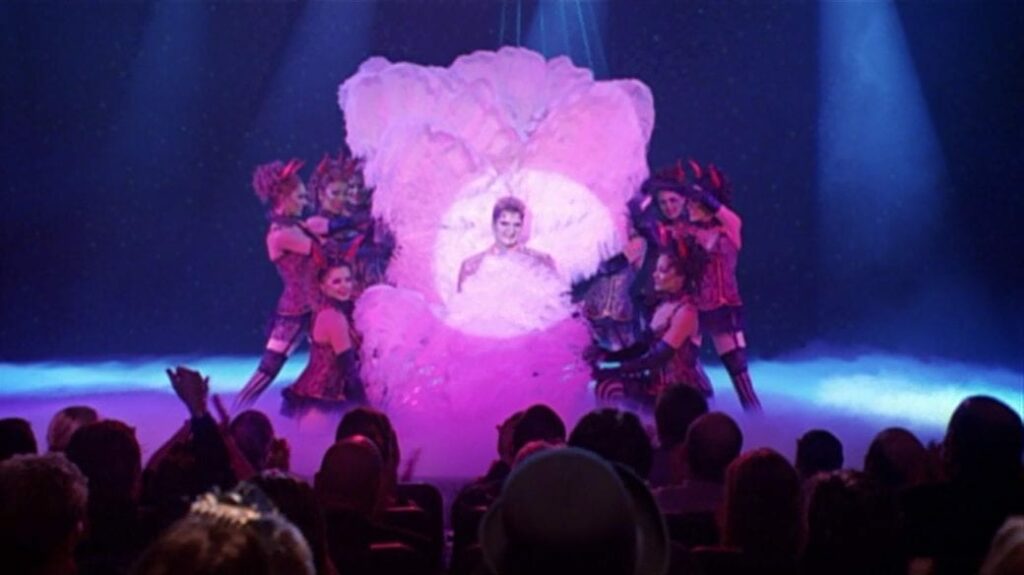
Upon his return, the demon becomes a more acknowledged and incorporated member of Team Angel. It’s great to see him finally fully appreciated by the narrative—though I believe the other characters do often take him for granted. When an amnesiac Cordelia comes back from the higher plane, Lorne is the go-to for helping to restore her memories. His first attempt to read her future leads him to witness visions of apocalyptic horrors that scare him so much that he flees to his room and won’t tell Angel what he saw. Wolfram and Hart later torture Lorne and extract his memories of Cordelia’s mind. In “Spin the Bottle” (S4E6), Lorne conducts a spell to bring back Cordelia’s memories which goes wrong in a style similar to Willow’s attempted spells often seen in Buffy, and hilarity ensues. Success is eventually achieved with the spell, but Lorne notes that the return of Cordelia’s memories awakened something powerful and evil inside her.
Despite being unable to read Cordelia properly to know she’s possessed, Lorne’s psychic abilities often come in handy throughout Season 4. He can give some warning before something bad is about to happen, such as in “Apocalypse, Nowish” when he tells Gunn to close the doors right before a flock of sparrows start slamming into them. His role in Angel Investigations is often secretarial, as he takes calls and deals with resources. Having a pacifist stance removes him from the frontline of fighting bad guys, and it stays this way until the last episode of the show.
“Players” (S4E16) sees Lorne used as bait to lure out Beastmaster!Cordy by mentioning a spell that will restore his anagogic abilities and allow him to read her. She makes an attempt on his life, but is caught red-handed by Team Angel. Throughout the end of Season 4’s Jasmine arc, Lorne remains entranced by her along with (almost) everyone else. He gives the “hourly Jasmine report” and hosts an open mic night in “The Magic Bullet” (S4E19), which is very much on-brand for him. However, once the spell is broken for him and the others at the end of the episode, Lorne joins the good fight against Jasmine. To be fair, this mostly involves being on the run and held hostage by Connor, but you know, the intentions are there. At least he’s properly involved at this point!
Team Angel are given a tour of Wolfram and Hart headquarters in the Season 4 closer “Home” to entice them into an uneasy alliance (if it can even be called that). The hook that gets Lorne is being offered the position of the head of the Entertainment Division—again, extremely on-brand. Organising events and maintaining communications with creative industries in Season 5 puts Lorne right in his element, but the pressure begins to take a toll on him. In S5E5 “Life of the Party”, Lorne inadvertently starts psychically influencing Wolfram and Hart employees at the Halloween party by having his ability to sleep removed. It’s a comedy-heavy episode, but the consequences of his subconscious powers are really quite severe, resulting in the creation of a powerful demon and two deaths. This emphasis of Lorne’s psychic abilities centres him as a truly significant force. Acknowledgement of the ridiculous amount of pressure he’s under in his job and the effort he puts into this is also made.
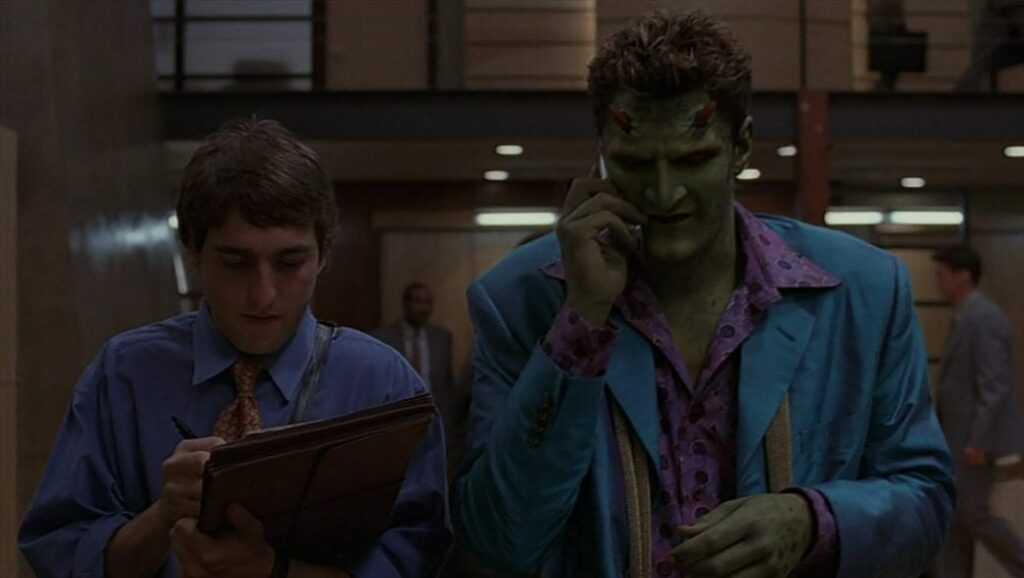
Sadly, Lorne grows more cynical and unhappy throughout the final season. He sees himself as a useless and underappreciated “cheerleader” for Angel and co. As he says to a bartender in “Underneath” (S5E17):
I think I’m tired. I think I’m sick and tired of wearing bells on my toes and making like everything’s gonna be okay. I think it’s pathetic that lately I’m too scared and sad to tell people the truth so I just say what they wanna hear instead. […] I’m gonna heave my tuchis off this stool, strap the bells on, and with a smile and a quip, go back into the belly of a very ugly beast and pretend like I can help. Hmm. ‘Cause that’s what the green guy does.
This is also in the aftermath of Fred’s demise, which Lorne deals with badly, perhaps worse than anyone. Due to Fred singing in “A Hole in the World” (S5E15), Lorne is the first to know she’s dying, which can’t have been easy for him. He keeps quiet about his feelings, but is obviously depressed, and admits to the same bartender that he started drinking as soon as he found out Fred was going to die. The event understandably destroys his cheerful outlook on life. To everyone, Fred was the bright light of everything pure and hopeful, and that being extinguished truly leaves a hole in the world. Lorne is filled with despair and additional loathing for his position at Wolfram and Hart. When Gunn is left in a hell dimension in replacement of Lindsey in “Underneath”, Lorne is the one who actually calls Angel and the others out for it. He’s shocked that they’d leave anyone behind, and morbidly supposes “that’s what we do now”.
As well as the moral dissonance of working at Wolfram and Hart, Lorne’s personal moral code starts to show cracks in Season 5. Driven by despair at the injustice of Fred dying, Lorne punches Eve in “A Hole in the World” and even threatens to kill her should he find out she was involved with Fred’s infection in the slightest degree. During this scene, he quotes something Fred once told him: “I think a lot of people would choose to be green. Your shade, if they had the choice.” Referring back to the potential racism analogy with Lorne, this quote relates most strongly to this reading. Fred loved him for who he was, finding delight and joy in his unconventional appearance. This shows that, despite his apparent confidence, Lorne does crave acceptance and feels deep appreciation and care for those who show it. When pushed to his emotional limits, he will participate in violence to protect the ones he loves.
Bearing this in mind, Lorne’s last moment in the show’s finale, “Not Fade Away”, is a culmination of pressure to break his anti-violence stance. He announces his plan to leave L.A., but Angel asks that he do one final job for him before he goes. Although Lorne refuses to participate in the battle and is extremely wary of Angel’s plan and motives, he agrees to do his part. As each member of Team Angel has a day off before it all kicks off, Lorne naturally elects to perform at a karaoke bar, singing “If I Ruled the World” by Tony Bennett. His mood is sombre, so we know whatever Angel has asked him to do must be serious. That, and the fact that he asks Angel not to try to ever find him again.
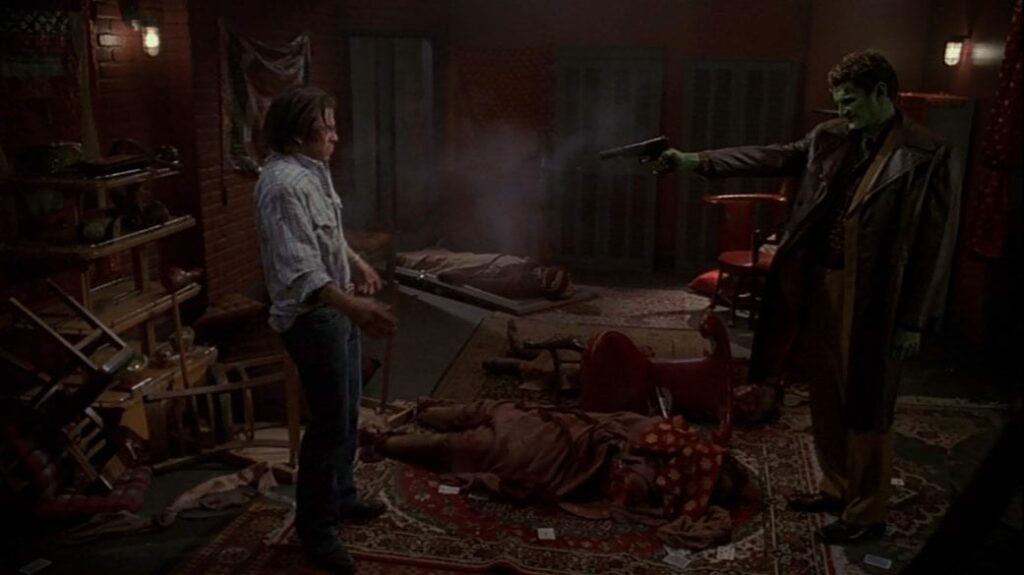
Teaming up with Lindsey, Lorne helps to destroy the Sahrvin Clan. Shortly afterwards, he shoots and kills Lindsey on Angel’s orders. As he says, “It’s not about what I think.” Angel couldn’t trust Lindsey to be part of the final fight, and chose Lorne to assassinate him after doing his part to avoid any potential double-crossing that could endanger the battle. It’s a valid point, and he had Lorne be the one to do it so Lindsey would never see it coming. Neither did we—that makes the moment all the more shocking and horrendous. Lorne is reduced to just a “flunky”, but more than that, it’s the ultimate betrayal of his core character and sense of self. Many characters fall from grace throughout Angel, but I think Lorne’s fall is the worst of all. Unlike Wesley or Angel himself, there’s no coming back from it, which is why Lorne can never return. I don’t blame the writers for going with the biggest gut-punch ending for his character (I mean, this is the same episode with Wesley’s tear-jerking death scene and That Ending we’re talking about), but it’s absolutely heart-breaking.
In 2009, Andy Hallett tragically passed away at age 33. But his fellow Angel cast members remember him fondly as the “life of the party”. The vibrance and energy Hallett brought to the role and the show in general is still discussed to this day. I know Lorne will always be one of my most beloved characters in television.


I watched Buffy and Angel in first run and am very glad to see the fandom and love for it alive and well after all this time! I’m revisiting Angel and now going down that rabbit hole!